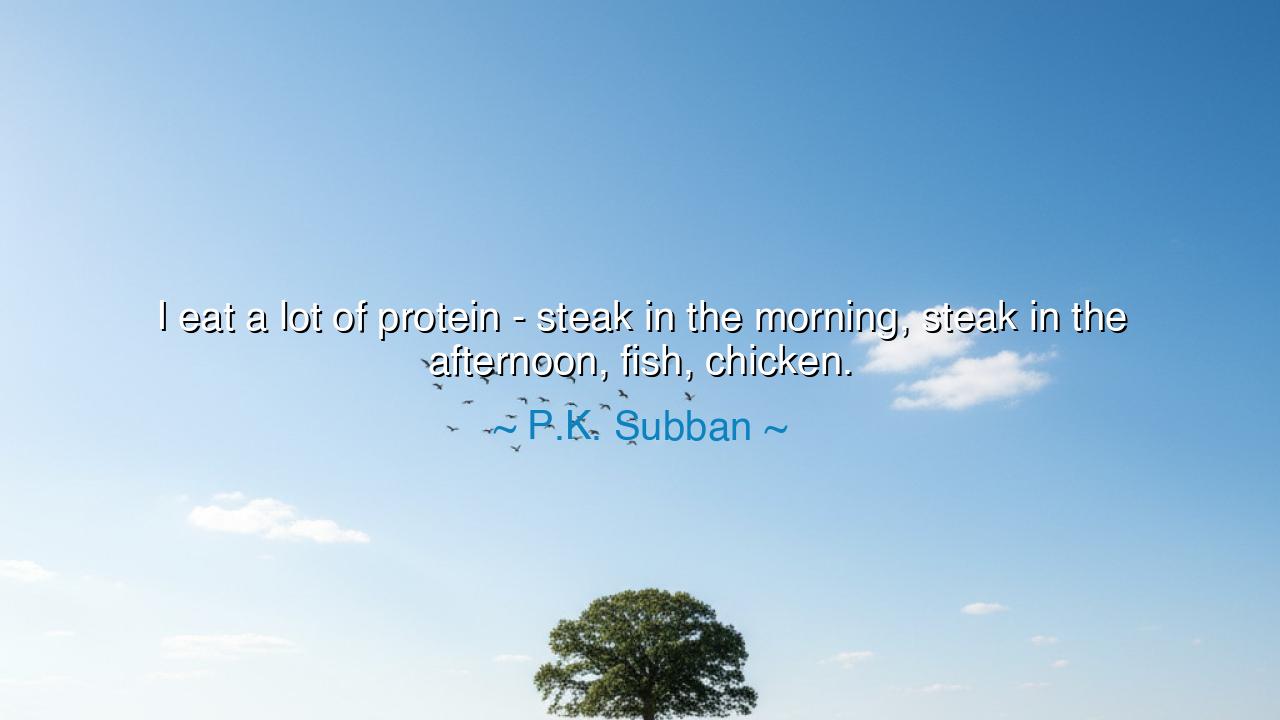
I eat a lot of protein - steak in the morning, steak in the






Hear the words of P.K. Subban, a warrior of the ice, whose body was his weapon and whose spirit was his flame: “I eat a lot of protein – steak in the morning, steak in the afternoon, fish, chicken.” At first, these words may seem only about diet and appetite. Yet beneath their surface lies a deeper truth: the body is the vessel of destiny, and to keep it strong is to honor the calling of one’s life. To feed oneself with purpose is not gluttony, but discipline; not indulgence, but preparation for the trials that await.
The meaning of his statement is thus both literal and symbolic. The warrior must build his fortress from the inside. By eating protein, Subban fuels the muscles that carry him into battle, for on the rink there is no mercy for the weak. His diet is not a matter of taste alone, but of strength, of endurance, of the relentless demand to be ready when the hour of contest arrives. What seems simple is in fact a creed: nourish thyself, that thou may not falter when duty calls.
The origin of such wisdom is as old as mankind’s struggle. In the camps of the Roman legions, soldiers consumed meat and grain to march farther and fight harder. The gladiators of the Colosseum, though often slaves, were fed with carefully chosen diets to keep their bodies honed for combat. Even in the East, the samurai and monks alike held to strict regimens of food, knowing that the path of mastery begins not in the sword-hand or the chanting tongue, but in the stomach that sustains them. Subban stands within this lineage, his steak and fish no different in spirit from the bread and meat of ancient warriors.
Let us recall the tale of Hercules, who, though born of divine blood, required mortal strength to complete his twelve labors. The myths speak not only of his power but of his constant preparation—rest, training, and sustenance. Had he neglected his body, the lion of Nemea would not have been conquered, nor the boar of Erymanthus subdued. Just as Hercules drew strength from daily discipline, so too does Subban remind us that the greatness we seek must be built day by day, bite by bite, choice by choice.
The lesson is clear: what you put into yourself determines what you can bring forth into the world. If you feed your body with weakness, your deeds will falter; if you nourish it with strength, your actions will thunder like the chariot wheels of the gods. This is not only about food, but about all forms of consumption: what you read, what you watch, what you allow into your mind and spirit. To feast on poison is to weaken; to feast on truth and discipline is to rise.
Practical action must follow. Treat your meals not as accidents, but as rituals. Choose food that strengthens rather than diminishes. Rise each day and ask yourself: Does this make me ready for the labors ahead? And beyond food, guard also the diet of your thoughts—consume wisdom instead of folly, courage instead of fear. In this way, your body, your mind, and your spirit will align like the triple strands of a rope that cannot be broken.
And so, child of tomorrow, remember the counsel hidden in Subban’s simple words. To eat with purpose is to live with purpose. To fuel your strength is to honor the calling placed upon your life. Whether you face the roar of an arena, the grind of labor, or the struggles of the heart, prepare yourself as the ancients prepared for war: with discipline, with intention, and with the quiet strength born from within. For victory begins not in the moment of battle, but in the countless choices made long before it.






AAdministratorAdministrator
Welcome, honored guests. Please leave a comment, we will respond soon